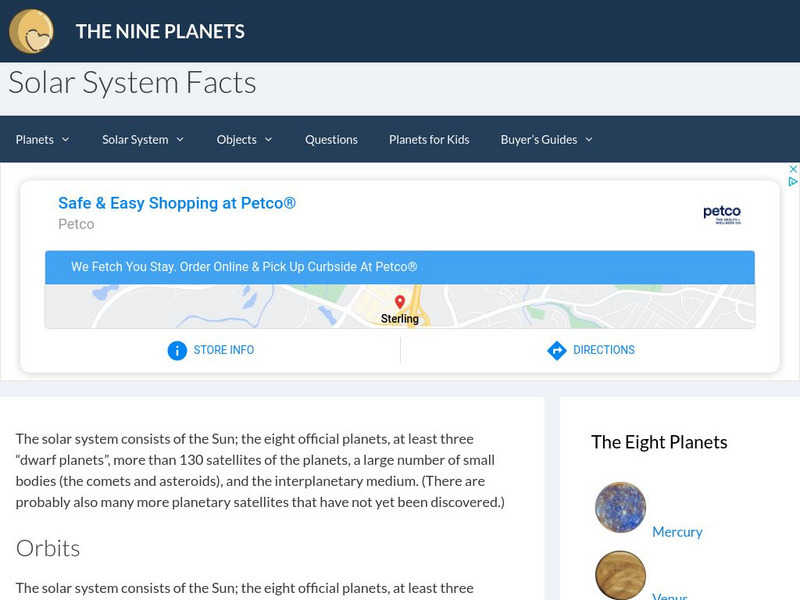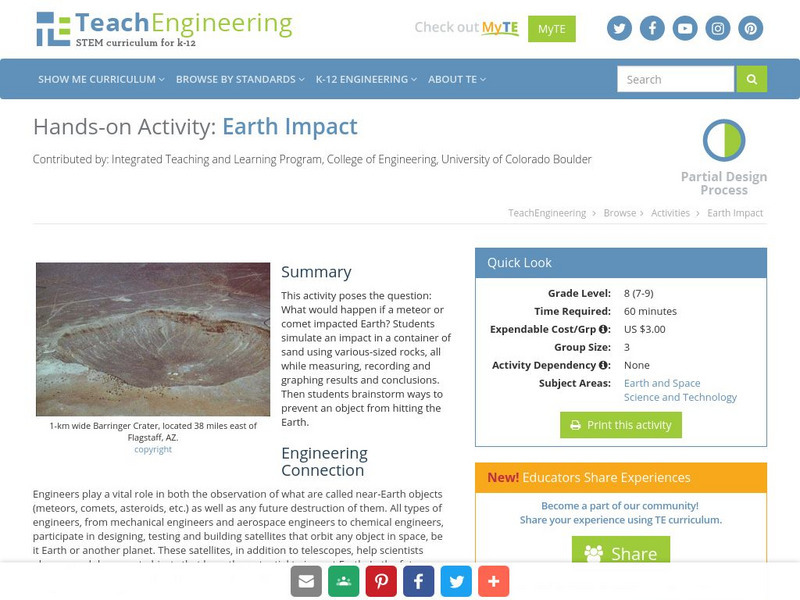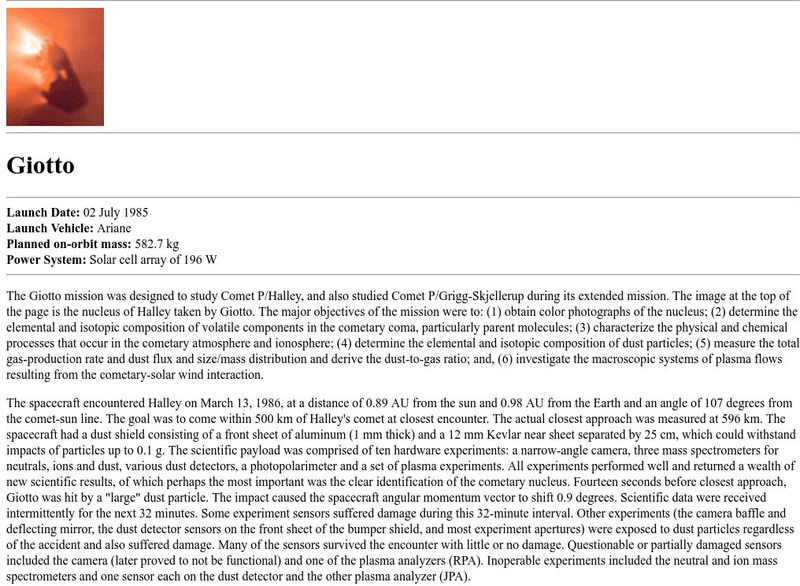Hi, what do you want to do?
National Earth Science Teachers Association
Windows to the Universe: Origin of Jupiter's Rings
University of Michigan and Windows to the Universe offers information showing that with the help of the Galileo spacecraft, scientists figured out that the rings are made from dust that was kicked off of the small moons surrounding...
NASA
Nasa: Our Solar System Overview
This site has links to all the planets, providing an overview of the solar system. It also contains information about asteroids, meteors, comets and other features of our solar system.
National Earth Science Teachers Association
Windows to the Universe: Our Solar System
Our solar system is filled with a wide assortment of celestial bodies - the Sun itself, our eight planets, dwarf planets, and asteroids - and on Earth, life itself! The inner solar system is occasionally visited by comets that loop in...
Ducksters
Ducksters: Astronomy for Kids: Glossary and Terms
Kids learn about the glossary and terms for the science of astronomy including words and definitions such as asteroid, comet, meteoroid, galaxy, eclipse, etc.
Nine Planets
The Nine Planets: An Overview of the Solar System
A detailed overview of the history, mythology, and current scientific knowledge of each of the planets and moons in the solar system.
NASA
Nasa Star Child: Star Child
StarChild from NASA defines and describes the Solar System in a simple and easy-to-understand manner. The website is broken down into two versions for the student, grade school and junior high.
ClassFlow
Class Flow: Asteroids, Meteoroids, and Comets
[Free Registration/Login Required] In this flipchart students will compare and contrast asteroids, meteoroids, and comets. They will also learn about their origins. Assessment questions are included.
Other
Space weather.com
Want to know what the current weather conditions are in space? Find everything here you may want to know about the latest solar flares, sunspots, asteroids and more. Site also includes essential web links to quench any user's thirst for...
Virginia Tech
Virginia Polytechnic Institute: Greenhouse Dinosaur Extinction Theory
This comprehensive page discusses the Asteroid Impact vs. Volcano-Greenhouse dinosaur extinction debate. It was written by paleontologist, professor, and scientist Dr. Dewey McLean.
NASA
Nasa: Solar System Exploration
Enter our solar system to interact with the planets, moons, asteroids, meteors, and more. Investigate with NASA scientists and explore missions related to space exploration. Read facts, compare statistics, look through resources, and...
TeachEngineering
Teach Engineering: Earth Impact
This activity poses the question: What would happen if a meteor or comet impacted Earth? Students simulate an impact in a container of sand using various-sized rocks, all while measuring, recording and graphing results and conclusions....
NASA
Nasa Space Science Data Archive: Photo Gallery: Galileo
A well-indexed collection of NASA images taken by the Galileo spacecraft. Images include the spacecraft itself prior to launch and all of the solar system objects this incredible mission has visited.
NASA
Nasa: What Is a Planet?
This lesson teaches students about the characteristics of planets, comets, asteroids, and trans-Neptunian objects. After learning about these different things, students then are to debate about a new object that is found in space.
PBS
Pbs Learning Media: Meteor Showers
This video segment adapted from NASA uses animation to illustrate the properties of meteor showers and comets. Included is are visualizations of a comet's tail and of Earth passing through a debris stream left behind by meteoroids.
PBS
Pbs Learning Media: Our Solar System Lithograph Set
View these amazing high-quality images of our solar system from NASA with this lithograph set. Each lithograph contains images, facts, dates, and general information on a particular subject. Background information and teaching tips are...
Space Telescope Science Institute
Amazing Science: Solar System Trading Cards
Amazing Science looks at the Solar System with this FAQ site and lesson plan.
Curated OER
Deep Space 1 Rendezvous'd With an Asteroid
This site from the National Aeronautics and Space Administration provides a fun project on rockets. "Nothing in space stands still. Everything either orbits around something else, or moves toward or away from something else. So how do...
Curated OER
Rocket Launched in Same Direction as Earth Orbit and Rotation
This site from the National Aeronautics and Space Administration provides a fun project on rockets. "Nothing in space stands still. Everything either orbits around something else, or moves toward or away from something else. So how do...
NASA
Nasa Space Science Data Archive: Giotto Mission
This site from the National Space Science Data Center provides information on the Giotto mission which was designed to study Comet P/Halley. The spacecraft encountered Halley on March 13, 1986 and approached to within 600 km. This page...
Cosmos 4 kids
Cosmos4 Kids: Solar System Details: Kuiper Belt
Explore space beyond Pluto in the Kuiper Belt region of our solar system. Find out about the space bodies that exist there and what our space missions have taught us about this far away region.
Lawrence Berkeley National Laboratory
Berkeley Lab: The Fruitful & Inventive Mind of Scientist Luis Alvarez
This article, reprinted from the fall 1979 LBL News Magazine, was written about Dr. Luis Alvarez and his part in the study of geological sediments and the great extinctions.
Scholastic
Scholastic: Study Jams! Science: Our Solar System: The Universe
A video and a short multiple-choice quiz on the Universe and what it is made up of.
E-learning for Kids
E Learning for Kids: Science: Antarctica/ What Are the Different Parts of the Universe?
In this lesson, students learn about objects in the universe, including constellations, planets, meteors, asteroids, and comets.
Nine Planets
The Nine Planets: Small Bodies
This site explores the smaller bodies in the solar system, namely the various asteroids and comets. Links are also provided for additional information on related subjects.




















